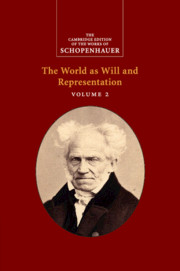Chapter 27 - On Instinct and Creative Drive
Published online by Cambridge University Press: 30 June 2022
Summary
With the creative drives of animals, it is as if nature wanted to hand the researcher on a plate an explanatory commentary on its operation according to final causes and on the amazing purposiveness of its organic productions that results. For these show us as clearly as possible that beings can work with the greatest decisiveness and determination towards an end they do not recognize, indeed, of which they have no idea. Examples include the bird's nest, the spider's web, the ant-lion hole, the well-crafted beehive, the wonderful termite hill, etc., at least for those individual animals that construct them for the first time, for they would not have been familiar with either the design of the work to be done, or its use. But organizing nature works in the very same way, which is why in the previous chapter I paradoxically explained the final cause as a motive that works without cognition. And just as it is the will that is obviously and admittedly active in the working of the creative drives, it is in truth the will that is active in the workings of organizing nature too.
One could say that there are two different ways of setting the will of animal beings in motion: either through motivation or through instinct, which is to say from the outside or from the inside, through an external occasion or through an inner drive: the former is explicable because it is external, the latter inexplicable because it is purely internal. Only, looked at more closely, the contrast between the two is not so sharp, indeed at base it turns into a difference of degree. For a motive works only under the assumption of an inner drive, i.e. of a particular constitution of the will, which is termed its character: the motive merely gives it a decisive direction on any given occasion – individualizing it for the concrete case at hand. Likewise instinct, although it is a decisive drive of the will, does not operate only from the inside like an elastic spring, but rather also waits for an external circumstance that it necessarily requires, and determines at least the time when it is expressed:
- Type
- Chapter
- Information
- Schopenhauer: The World as Will and Representation , pp. 357 - 363Publisher: Cambridge University PressPrint publication year: 2018

